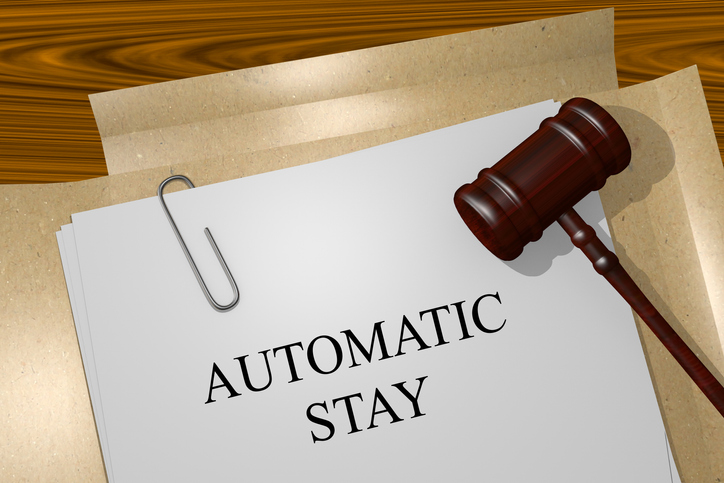Filing for bankruptcy can be a difficult decision, but when creditors threaten to take legal action or when debt collectors become harassing, it may be the solution for individuals and businesses struggling to manage debts. That is because the filing of a bankruptcy petition imposes an automatic stay, one of the fundamental protections afforded to debtors during the bankruptcy process. The Dallas bankruptcy attorneys at Toronjo & Prosser Law can help you secure this powerful safeguard.
The automatic stay provides debtors with some degree of relief by temporarily stopping creditors from pursuing certain actions and prohibiting collection efforts. It is described as automatic because the act of filing the bankruptcy petition is all that is required to bring it into effect. There is no need to make a motion for a stay and there is no need to show irreparable harm. The injunction springs into existence the moment a debtor files the bankruptcy petition. Once the stay is triggered, creditors are enjoined from taking any action outside of the bankruptcy forum to enforce or collect prepetition debts or to assert or enforce claims against property of the debtor or property of the estate.
What Is the Purpose of the Automatic Stay?
This automatic stay is a cornerstone of bankruptcy law. It is designed to help ensure that debtors receive a fresh start while also promoting the evenhanded treatment of creditors. Overall, the stay serves three main purposes in bankruptcy cases:
- Halts all collection efforts against a debtor to allow time to come up with a plan to get out of the financial situation that caused the bankruptcy filing in the first place
- Prevents a chaotic scramble for the debtor’s assets in a multitude of uncoordinated proceedings in different courts, an
- Harmonizes the interests of the creditors and the debtor and maintains the status quo.
The automatic stay helps both the debtor and creditors alike. It gives the debtor a breathing spell from the demands and pressures of creditors while the debtor attempts a repayment or reorganization plan. It assures all creditors that other creditors are not scrambling to other courts to try to drain the debtor’s assets. It also provides the trustee time to collect the debtor’s assets and liquidate them for the benefit of all creditors, thereby providing for an orderly liquidation or administration of the bankruptcy estate.
What is the Scope of the Automatic Stay?
The automatic stay is extremely broad in scope and applies to almost any type of formal or informal action aimed at recovering the debt. Any act to obtain possession of property of the state or of property from the estate or to exercise control over property of the estate will be subject to the automatic stay. The same holds true for any act to collect, assess, or recover a claim against the debtor that arose before the bankruptcy petition is filed. This means that the automatic stay will suspend:
- Foreclosure actions
- Creditor lawsuits
- Wage garnishments
- Liens
- Repossessions
- Collection letters and telephone calls
The automatic stay is binding on all entities including corporations of all types and individual creditors. The stay applies even when the government acts as a creditor. It does not matter if the creditor is secured or unsecured. It also makes no difference where the debtor’s property is located. All creditors have an affirmative duty to comply with the injunction for as long as the stay is in effect, and violators can face significant penalties. Whether or not a creditor knows that a bankruptcy petition was filed, acts taken in violation of the stay will be deemed legally invalid from the start.
While the power of the automatic stay is far-reaching, it is not unlimited. For example, in Chapter 7 cases, the stay does not extend to separate legal entities such as corporate affiliates, partners in debtor partnerships, or codefendants in pending litigation. Exceptions to the automatic stay are interpreted narrowly. The stay will remain in place for the duration of the bankruptcy case, but in some instances, creditors can ask the court to lift the stay before the case is over and before the debt is discharged.
Choose Toronjo & Prosser Law
The automatic stay is one of the most important features of the bankruptcy system. It applies to all forms of bankruptcy, but there are significant differences between Chapter 7 liquidation and the various forms of rehabilitation under Chapter 11. This means that the impact of the stay may vary depending on the type of relief you seek. You will need an experienced and knowledgeable bankruptcy lawyer to guide you through this process and advocate for you when creditors try to circumvent the stay.
At Toronjo & Prosser Law, our Dallas bankruptcy attorneys are well versed in the Texas Bankruptcy Code and the United States Bankruptcy Code and can get you started on the path toward obtaining the immediate injunctive relief provided by the automatic stay. To see if bankruptcy is the right option for you, call Toronjo & Prosser Law today for your free consultation.

